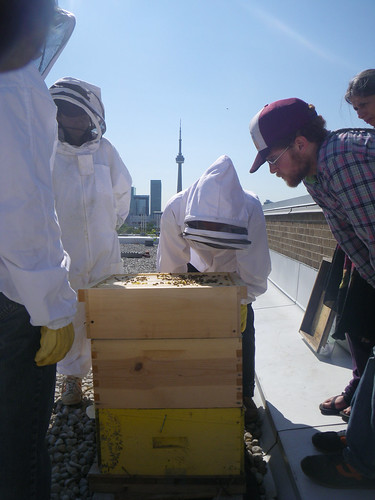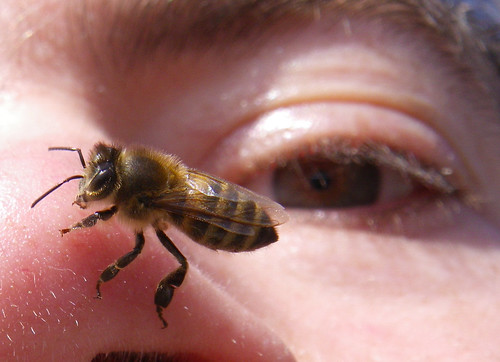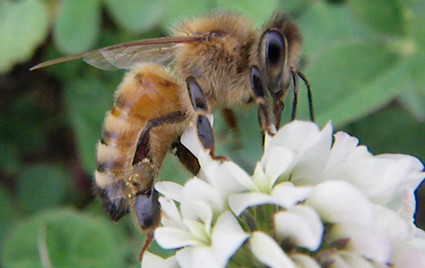Thinking of becoming a beekeeper?
Start with our list of the top ten questions you need be think about before getting started.
I also run a hands-on, season long, beekeeping course. More details on the Toronto Honeys site if you are interested in applying.
Why Urban Beekeeping?
As an city-boy the draw to beekeeping was simple. I was generally concerned about the environmental impact of industrial agriculture, and the quality of my food supply. As a result I wanted to become more involved in the production of my own food. While working at a community garden I learned there was a group doing beekeeping.
At the time the notion of keeping bees seemed like a wild dream. I do love honey so I decided being able to see how it's made was an opportunity I should jump at. Never mind the fact that I had up to this point been afraid of bees and was uncertain if I was allergic to their stings. I was careful my first season as a beekeeper and didn't get stung at all. I've since learned that I'm not allergic and very few people really are.
Challenges to urban beekeeping in Toronto
The greatest impediment to keeping bees in this city is the Ontario bee act. Though many cities around the world have recently opened up the doors to beekeepers, our provincial law specifies that hives must be kept at a distance of 30m from property lines (or 10m from highways). Though the act isn't enforced unless someone complains about your bees, it makes me reluctant to keep a hive at my own house and drives others to practice beekeeping covertly without the benefit of the provincial inspector.
On the other hand there certainly seems to be wide spread interest in beekeeping, and many different parties are competing for locations. Without the 30m rule, we'd likely need some form of regulations around hive density or we'd see an over abundance of bees in the city similar to what has been reported in New York and London.
So far both the local media and the public have been very receptive to the concept of urban bees. So I can't exactly say public relations is a problem, but it is certainly something I think about a great deal. Many Toronto beekeepers are just jumping in and hoping to figure things out as they go. The problem is, even among those who've been doing this for a while, it's a very small minority that have a reasonable sense of what is involved in managing population growth. This has resulted in some overcrowded apiaries, lots of swarms getting away from beekeepers, and feral colonies setting up homes in places where they are not wanted and need to be removed.
So far not a big deal, but I fear as our cities bee population grows we might see a backlash similar to what New York experienced after a few swarms clustered on busy public streets. With this in mind, I've put in a great deal of effort towards mastering the art of population control and have established relationships with farms where I can bring bees if my city locations exceed capacity.
I'd also say some work still needs to be done increasing the general public's comfort level around bees, showing that these generally docile creatures are not a serious threat and that they differ from wasps.
Why not move to a farm if you want to keep bees?
Well, there is a great deal I enjoy about the urban lifestyle, but I probably would move to a farm if I saw it as a good opportunity for me. It's just very difficult to see myself becoming a full time beekeeper at this time. It's a profession that is facing some monumental challenges and it would make for a very risky career move.
There might be a great deal of concrete here but there is also a great diversity of flowers. In contrast, much of our agricultural land has been transformed into large mono-crop operations that depend on the heavy use of pesticides which consequently makes it uninhabitable for bees.
Where do city bees find flowers?
The quality of forage varies widely by neighbourhood, a few well planted gardens here, a street lined with a bunch of the right kind of trees there, an empty lot over grown with wild flowers before being developed does add up.
On the other hand, with some locations we've seen our hives consistently under-produce, and have had to accept that there was simply not enough forage in the area for the number of hives that had been set up in the area.
Beekeeping groups and associations
Resonating Bodies - "A series of art and community projects which focus on pollination ecology, with special attention paid to the intersection of native bees, habitat and coevolution of plants and pollinators of Toronto, Canada and beyond"
Urban Toronto Beekeepers' AssociationThey've been meeting once a month since 2013. Meetings typically feature a speaker presenting a topic. They also have a facebook group.
Toronto Beekeepers Co-op - This group has been operating at different sites in Toronto since the early 2000's. A limited number of new members are accepted every year. Members learn the art of beekeeping along side staff beekeepers through the collective management of the hives.
Toronto District Beekeepers’ Association - Membership is open to all. The groups meets once a month throughout the beekeeping season. The group has been around over 100 years and attracts all sorts of beekeepers. The meetings are held just a little outside of Toronto at the Kortright Centre in Vaughan.
U of T B.E.E.S. - The university of Toronto's student beekeeping club at the st.George campus.
Bee supply shops
It's a bit of a niche market, and there's not a whole lot of options out there. If making a long trip it's not a bad idea to call ahead and make sure that they have what you need in stock.
Propolis-etc. (Near Keele and Sheppard) - They also have a few shops around Ontario and Quebec.
A list of equipment suppliers for all of Ontario can be found on the Ontario Beekeepers' Association's site.
You can also have supplies shipped to you from Bee Maid in Manitoba.






i want to visit bee fram and buy some honey...how?
thanks & regards,
Badar
I am a small beef farmer in northern Ontario and am interested in raising bees in my area I would like info on this
The best first step you can take is to connect with other beekeepers in your area. The will have the bee wisdom specific to your location. Are any of the associations listed at http://www.ontariobee.com/community/local-beekeepers-associations close to you?
You may also want to read whatever you can get your hands on. I'd recommend starting here: http://www.beekeeping.isgood.ca/resources/books/beekeeping-basics-pdf
Is there an urban beekeeper who would install hive on my roof and manage it and harvest honey for food banks
I have a honeycomb on a shelf on the outside wall of my kitchen. It is about the size of a lemon and there are bees flying around my tiny backyard. I don't want to harm them. but I would like them to go elsewhere and I want to remove the honeycomb. What can I do?
I'd leave them Bee, if they are honeybees (but they might just be wasps instead)and you arent using the area directly around that shelf outside (ie a chair etc within several feet of the hive). There are bees flying around everywhere if you stop and look closely enough. But not as much as there used to be it seems.